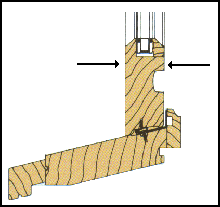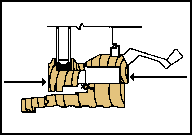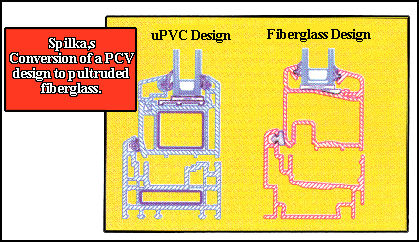|
Stephen's Column
Double Hung Inherently Flawed
Double Hung windows are a permanent part of our architectural heritage. They are particularly ubiquitous throughout the Eastern United States. In some counties the only things that aren’t double hung are the Front Doors (the back doors being double hung).
With such a humungous market why don’t we have a fiberglass double hung?
Thermotech’s focus is on energy efficiency and a double hung is inherently not as energy efficient as a hinged window, such as a casement. Firstly a double hung window is not as air tight as a casement window. The double hung window has to slide, so its weatherstripping can’t be as tight as a casement or it won’t slide. That’s obvious to most people.
What is not so obvious is that sliding windows aren’t as air tight as casements because the weatherstripping changes plane. Think of the bottom sash of a double hung. The bottom and side rails are weatherstripped along the edge of the rail. But what about the meeting rail? It’s weatherstripped along the outer face. It is difficult, very difficult, to maintain the integrity of the air seal through this change of plane.
Despite the fact that double hung windows are inherently draftier than casements, this does not have a major effect on your annual heating bill. The reality is that as long as new windows can maintain their tested air tightness (this topic will be the subject of a future column) very little of the window’s heat loss is due to air leakage.
Most of the annual heat loss from reasonably tight windows is from conductivity losses through the frame, spacer and glass. This is where double hung windows really fall down, (so to speak). All sliding windows have inherently cold frames compared to hinged windows, like casements. The sash in a casement window is ‘insulated’ on the inside by the hardware cavity. The sash in a double hung window has no such advantage.
Typical Double Hung Sill

Typical Casement Sill

Another inherent thermal weakness in any sliding window is the meeting rail. Thermally it is the weakest part of any sliding window. The upper sash in a double hung not only loses heat through its outer face, but also through its lower edge. It is cooled on two sides. That’s why the bottom edge of the upper sash experiences condensation before the lower sash.
On top of the inherent thermal drawbacks to the double hung there are some nuts and bolts engineering reasons for dragging our heels on the double hung. The window world is fast becoming a vinyl world. One of the inherent advantages of fiberglass compared to vinyl is its strength. This means that compared to vinyl windows many internal walls can be eliminated. Larger single cavity sections allow the economical insertion of polystyrene insulation. The strength advantage can also be used to reduce the size of some sections. This is especially true for casement windows as shown by Spilka’s conversion below:

Fibreglass as a material is more expensive than vinyl so this section simplification is important to being competitive. The same degree of simplification is not possible with a double hung frame. Nearly all of the internal walls in vinyl windows have a role other than adding stiffness. This means that compared to vinyl the percentage upcharge for fiberglass is likely more for a double hung than it is for a casement.
So why, then, do we have a sliding patio door, single hung and single slider? For the same reason that we will have to have a double hung very soon.
Customers want them. (Besides a fibreglass double hung still has the advantages of fiberglass’s low coefficient of thermal expansion.)
- Frame In? Frame Out?
- All Low e’s Are Not Created Equal
- Double Hung Inherently Flawed
- The Road Less Travelled
- The Affordable Energy Efficient House
- Green Priorities - Skin Deep Not Deep Enough
- Embodied Energy - As Important As Low Energy Design?
- Energy-Star's Solar Eclipse Ending?
Back to the Top
Home
Contact Us Search
Why Thermotech Consumer's
Guide Products
Links Stephen's Column
Copyright © 2010 by Thermotech Windows Ltd.
Telephone: 1-888-930-9445 Facsimile: 613-839-9066
Website
design and layout by 2Design Web
Contact the Webmaster |

